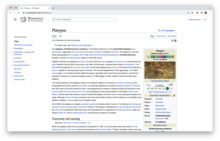|
Online encyclopediaAn online encyclopedia, also called an Internet encyclopedia, is a digital encyclopedia accessible through the Internet. Some examples include Encyclopedia.com since 1998, Encarta from 2000 to 2009, Wikipedia since 2001, and Encyclopædia Britannica since 2016. Digitization of old content In January 1995, Project Gutenberg started to publish the ASCII text of the Encyclopædia Britannica, 11th edition (1911), but disagreements about the method halted the work after the first volume. For trademark reasons, the text had been published as the Gutenberg Encyclopedia.[1] Since then, Project Gutenberg digitized and proofread the encyclopedia, until the last update in September 2018. Project Gutenberg published volumes in alphabetical order; the most recent publication is Volume 17 Slice 1: "Lord Chamberlain" to "Luqman", published on August 9, 2013.[2] The latest Britannica was digitized by its publishers, and sold first as a CD-ROM,[3] and later as an online service.[4] In 2001, ASCII text of all 28 volumes was published on Encyclopædia Britannica Eleventh Edition[5] by source; a copyright claim was added to the materials included. The website no longer exists. Other digitization projects have made progress in other titles; one example is Easton's Bible Dictionary (1897) digitized by the Christian Classics Ethereal Library.[6] A successful digitization of an encyclopedia was the Bartleby Project's online adaptation of the Columbia Encyclopedia, Sixth Edition,[7] in early 2000 and is updated periodically. Other websites provide online encyclopedias, some of which are also available on Wikisource. However, some may be more complete than those on Wikisource, or may be from different editions. Creation of new contentAnother related branch of activity is the creation of new, free content on a volunteer basis. In 1991, participants of the Usenet newsgroup alt.fan.douglas-adams[8] started Project Galactic Guide to produce a real version of The Hitchhiker's Guide to the Galaxy, a fictional encyclopedia used in the works of Douglas Adams. Although it originally aimed to contain only real, factual articles, the policy was changed to allow and encourage semi-real and unreal articles as well. Project Galactic Guide contains over 1700 articles, but no new articles have been added since 2000, which was a year after the foundation of h2g2. The 1993 Interpedia proposal was planned as an encyclopedia on the Internet to which everyone could contribute materials. The project never left the planning stage and was overtaken by a key branch[clarification needed] of old printed encyclopedias. Another early online encyclopedia was called the Global Encyclopedia. In November 1995, James Rettig, Assistant Dean of University Libraries for Reference and Information Services at College of William & Mary, presented an unfavorable review at the 15th Annual Charleston Conference on library acquisitions and related issues. He said of the Global Encyclopedia:[9]
Examples of article entries included Iowa City:
 Wikipedia is a free content, multilingual online encyclopedia written and maintained by a community of volunteer contributors, known as Wikipedians, through a model of open collaboration. It is the largest and most-read reference work in history.[10] Wikipedia originally developed from another encyclopedia project called Nupedia.[11] See alsoReferences
External linksWikimedia Commons has media related to Internet encyclopedias.
|